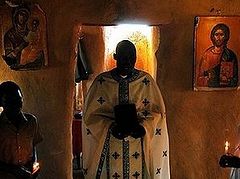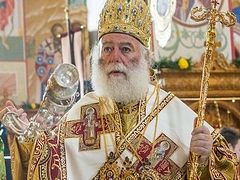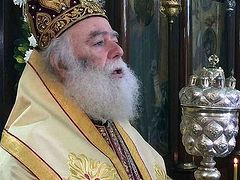Source: Orthodox History
September 13, 2021
 Patriarch Iakovos of Alexandria was chosen by the Patriarchs of Constantinople, Antioch, and Jerusalem in 1861. The Patriarchate of Alexandria was founded by the Apostle Mark, at a time when Alexandria was essentially the second city of the Roman Empire, after Rome itself. Largely because of this, in the earliest centuries of church history, the Church of Alexandria was second only to Rome in preeminence among the churches, a notch ahead of Antioch. After the rise of Constantinople and the reestablishment of Jerusalem in the fifth century, Alexandria had a secure place as one of the Pentarchy — the five churches that held a special place of leadership in the global Orthodox Church.
Patriarch Iakovos of Alexandria was chosen by the Patriarchs of Constantinople, Antioch, and Jerusalem in 1861. The Patriarchate of Alexandria was founded by the Apostle Mark, at a time when Alexandria was essentially the second city of the Roman Empire, after Rome itself. Largely because of this, in the earliest centuries of church history, the Church of Alexandria was second only to Rome in preeminence among the churches, a notch ahead of Antioch. After the rise of Constantinople and the reestablishment of Jerusalem in the fifth century, Alexandria had a secure place as one of the Pentarchy — the five churches that held a special place of leadership in the global Orthodox Church.
In the centuries that followed, Alexandria technically retained its place in the Pentarchy, but in practice it fell into deep decline. The fifth century Monophysite heresy split the Alexandrian Church, and the seventh century Arab conquest of Egypt reduced the Patriarchate to a shell of its former self. Metropolitan Makarios Tillyrides of Kenya refers to the Arab period as “one prolonged torment for Christians of Egypt.” During this era, the Orthodox population of the Patriarchate fell from 300,000 to 100,000. Many Patriarchs of Alexandria moved to Constantinople, living there permanently. Metropolitan Makarios writes, “It was not unknown for the election of the Patriarch to take place there.”
In 1517, the Ottoman Empire conquered Egypt, and this event offered a new lease on life for the Patriarchate, as the Ottoman Sultan promised to safeguard Alexandria’s rights and privileges. The Ottomans opened up Egypt to trade with the West, leading to contacts between Alexandria and the European powers and their churches. Representatives from the Patriarchate, including the Patriarch himself, began fundraising tours in the West by at least the mid-17th century, and the Patriarchate became a focal point for rivalry between Roman Catholic and Anglican/Protestant missionaries. While not as glorious as it was before the Arab conquest, the Patriarchate was once again in a position of influence and relevance in the broader Orthodox world. Land donations in places like Wallachia and Moldavia gave the Patriarchate newfound financial stability. Having said all this, the actual Orthodox flock of Alexandria was tiny: a small community that spoke Arabic, ruled over by immigrant Greek-speaking bishops.
This brings us to the 19th century, which Metropolitan Makarios says “could most aptly be described as the period in which the Patriarchate of Alexandria experienced a renaissance.” And in one sense it was: the ruler of Egypt, Muhammad Ali, was technically an Ottoman vassal, but in practice he was an all-powerful autocrat who ruled a de facto independent Egypt as he saw fit from 1805 to 1848. Ali encouraged large-scale Greek immigration to Egypt, leading to the growth of the Patriarchate and its re-establishment as a fully functional church. At the same time, the 19th century also witnessed numerous instances in which Alexandria’s status as an autocephalous church was, if not officially rejected, at least practically ignored.
... Read the rest at Orthodox History.




